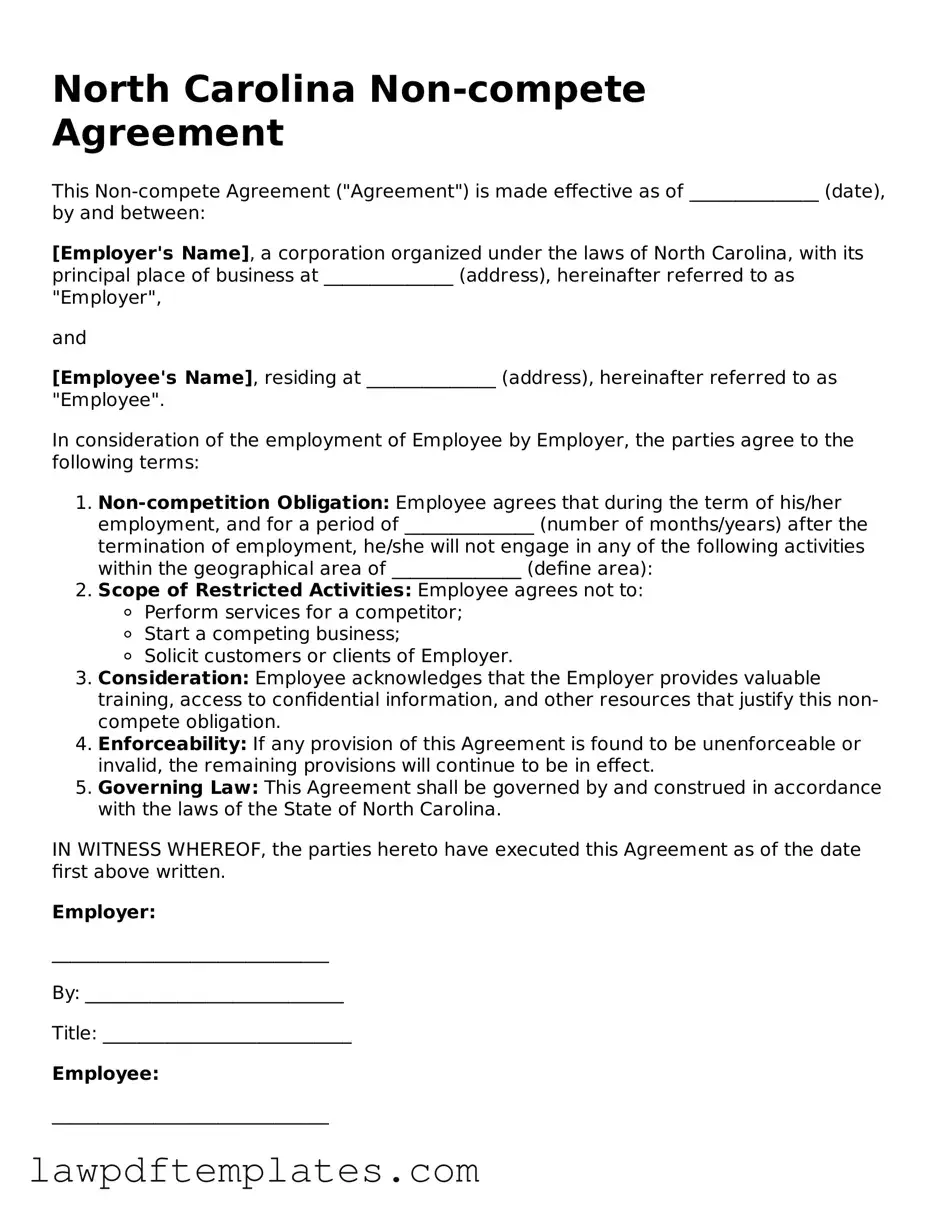Free Non-compete Agreement Template for the State of North Carolina
Form Breakdown
| Fact Name | Description |
|---|---|
| Definition | A non-compete agreement is a contract that restricts an employee from working for competitors or starting a similar business for a specified time after leaving a job. |
| Governing Law | In North Carolina, non-compete agreements are governed by common law principles and specific statutes, including N.C. Gen. Stat. § 75-4. |
| Enforceability | These agreements are enforceable if they are reasonable in duration, geographic area, and scope of activity restricted. |
| Duration | Typically, non-compete agreements in North Carolina should not exceed a duration of two years to be considered reasonable. |
| Consideration | For a non-compete agreement to be valid, there must be consideration, which is something of value exchanged between the parties, such as a job offer or promotion. |
| Limitations | North Carolina courts may refuse to enforce overly broad non-compete agreements that unduly restrict an individual's ability to earn a living. |
Sample - North Carolina Non-compete Agreement Form
North Carolina Non-compete Agreement
This Non-compete Agreement ("Agreement") is made effective as of ______________ (date), by and between:
[Employer's Name], a corporation organized under the laws of North Carolina, with its principal place of business at ______________ (address), hereinafter referred to as "Employer",
and
[Employee's Name], residing at ______________ (address), hereinafter referred to as "Employee".
In consideration of the employment of Employee by Employer, the parties agree to the following terms:
- Non-competition Obligation: Employee agrees that during the term of his/her employment, and for a period of ______________ (number of months/years) after the termination of employment, he/she will not engage in any of the following activities within the geographical area of ______________ (define area):
- Scope of Restricted Activities: Employee agrees not to:
- Perform services for a competitor;
- Start a competing business;
- Solicit customers or clients of Employer.
- Consideration: Employee acknowledges that the Employer provides valuable training, access to confidential information, and other resources that justify this non-compete obligation.
- Enforceability: If any provision of this Agreement is found to be unenforceable or invalid, the remaining provisions will continue to be in effect.
- Governing Law: This Agreement shall be governed by and construed in accordance with the laws of the State of North Carolina.
IN WITNESS WHEREOF, the parties hereto have executed this Agreement as of the date first above written.
Employer:
______________________________
By: ____________________________
Title: ___________________________
Employee:
______________________________
Common mistakes
Filling out a Non-compete Agreement form in North Carolina requires attention to detail. One common mistake is failing to clearly define the scope of the agreement. Without specific language outlining the type of work restricted, the agreement may be deemed unenforceable. Vague terms can lead to confusion and disputes down the line.
Another frequent error is neglecting to specify the duration of the non-compete clause. North Carolina courts typically favor reasonable time limits. If the duration is too long, it may not hold up in court. A well-defined timeframe helps both parties understand their rights and obligations.
People often overlook the geographic limitations of the agreement. It’s essential to define where the non-compete applies. A broad geographic scope can render the agreement unenforceable. Clear geographic boundaries protect both the employer's interests and the employee's right to work.
Many individuals fail to consider the consideration, or compensation, for signing the agreement. In North Carolina, for a non-compete to be valid, there must be some form of consideration. This could be a job offer, a promotion, or other benefits. Without adequate consideration, the agreement may not hold legal weight.
Another mistake is not reviewing the agreement with legal counsel. People often sign documents without fully understanding the implications. Consulting with a lawyer can provide clarity and ensure that the agreement complies with state laws. This step is crucial in avoiding future legal complications.
Lastly, individuals sometimes ignore the importance of mutuality in the agreement. If only one party is bound by the non-compete, it may not be enforceable. Both parties should have obligations outlined in the agreement. Ensuring mutuality strengthens the agreement and increases its chances of being upheld in court.
Discover More Non-compete Agreement Templates for Specific States
Non Compete Agreement Florida Pdf - Clear definitions of terms within the agreement help prevent confusion and legal disputes later.
To facilitate the property sale process, you can find the necessary paperwork and resources at PDF Documents Hub, which provides a comprehensive guide to completing the Texas Real Estate Purchase Agreement form correctly.
Non Solicitation Agreement Illinois - Signing this form may limit your job opportunities in the same industry after your employment ends.
